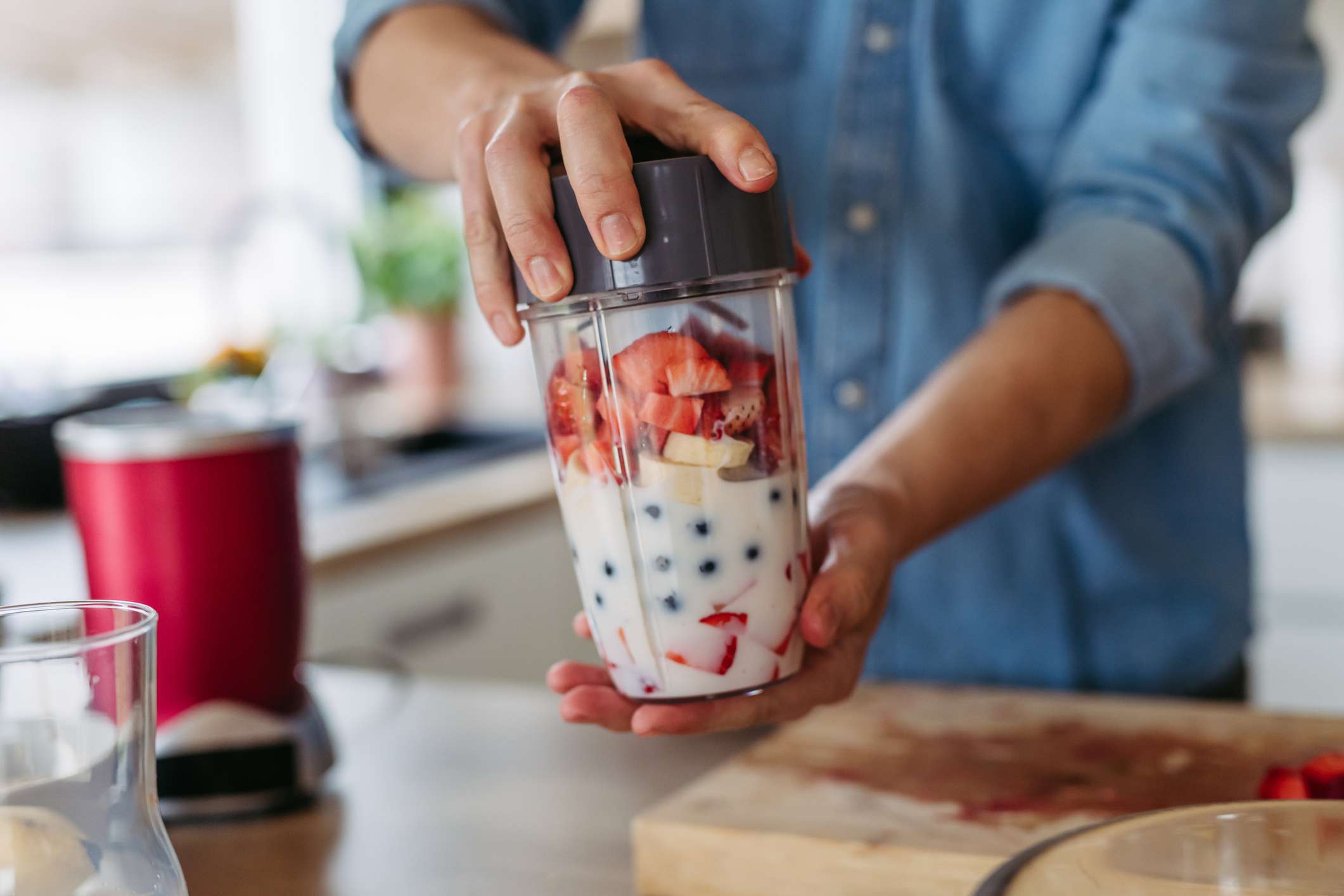
:max_bytes(150000):strip_icc():format(jpeg)/Health-GettyImages-SmoothieAdditivesForPoop-05b777f4f9fb4f52a992a524fa93f726.jpg)
Smoothies made with healthy ingredients offer a convenient and customizable way to boost your intake of fiber, fluids, and essential vitamins and minerals, which can help improve symptoms of constipation or irregular bowel movements.
Constipation is when you have fewer than three bowel movements a week. Your stools are hard, dry, or lumpy, making them difficult or painful to pass. It can be caused by factors like digestive issues, such as irritable bowel syndrome (IBS) or pelvic floor disorders, as well as certain medications or supplements.
Your diet also plays a big role in your regularity, especially if you’re not getting enough fiber and fluids. Fiber can aid digestion and relieve constipation by softening your stool, making it easier to pass. Drinking plenty of fluids, like in smoothies, can enhance fiber’s effectiveness, further softening stools and promoting smoother bowel movements.
Chia seeds are high-fiber, providing 9.75 grams (g) per 1-ounce (oz) serving, which fulfills 35% of the Daily Value (DV). Insoluble fiber, which makes up most of the fiber in chia seeds, adds bulk to stool and promotes regular bowel movements. Seeds, in general, are excellent sources of this type of fiber.
Chia seeds also contain omega-3 fatty acids, minerals, B vitamins, and health-promoting compounds like polyphenols. Their subtle nutty flavor complements other ingredients in smoothies.
Like chia seeds, flaxseeds have a mild taste and are packed with fiber, nutrients, antioxidants, and inflammation-fighting compounds. They’re high in fiber, with 2.81 g per tablespoon (10% of the DV), which contributes to their ability to alleviate constipation.
You can find flaxseeds in whole or ground form at grocery stores.
Psyllium husk comes from the seeds of the Plantago ovata plant. It contains oligosaccharides, sugars that help good bacteria in the gut grow. It also increases the production of short-chain fatty acids, which support colon (large intestine) health.
Psyllium husk can hold water and help it move into the colon, making stools softer and easier to pass. Its neutral flavor makes it a valuable addition to smoothies.
You can add instant or rolled oats directly to your smoothies since they’ve been steamed and dried during processing. A 28-gram serving (about 1 oz) of dry instant oats offers 2.8 g of fiber (10% of the DV).
Oats contain beta-glucan, a fiber that can lower cholesterol and improve blood sugar levels. Beta-glucan and other compounds like polyphenols in oats have been shown to support gut bacteria, which is important for overall health, including digestive health. Research shows that an imbalance in gut bacteria may lead to constipation and IBS with constipation.
Oat bran is the outer layer of the oat grain, finer and smoother than regular oats, making it easier to blend into smoothies for a creamy texture. Most of the fibers in oats, such as beta-glucan and cellulose, are found in the hull of the oat.
Cellulose is an insoluble fiber that adds bulk to stool and promotes laxation. A half-cup serving of oat bran provides 7.7 g of fiber (28% of the DV).
Prunes add natural sweetness to any smoothie and are well-known for their ability to help relieve constipation due to their high fiber and sorbitol content.
Prunes are one of the few fruits studied specifically for relieving constipation. Some studies even suggest they outperform psyllium in stool frequency and consistency.
Kiwis are a source of cellulose and pair well with various fruits, such as berries and tropical fruits. Kiwis also blend perfectly with leafy green-based smoothies.
Like prunes, kiwis are one of the few fruits studied for relieving constipation. They help hold more water in the intestines and increase stool volume, leading to more frequent and softer stools.
Mangoes are another fruit-based laxative that may help ease constipation. Rich in vitamin C, mangoes add a sweet, tropical flavor to smoothies, pairing well with other fruits and leafy greens.
You can add fresh mango to your smoothie or use frozen mango chunks, which are available in most grocery stores’ frozen fruit sections.
Figs are used in traditional medicine to treat various conditions, including constipation. Fig paste, in particular, has been shown to reduce colon transit time (how long it takes food to move through the colon and become stool) and improve stool type and abdominal discomfort compared to a placebo.
Figs are available in fresh, dried, or paste forms.
Avocados are packed with healthy monounsaturated fats and fiber like cellulose, providing 10 g of fiber per cup of cubed avocado (36% of the DV). Avocados also act as a prebiotic, supporting gut health by helping good bacteria grow.
Adding avocado to a smoothie creates a creamy texture and adds a mild, buttery taste. You can find fresh avocados in stores, as well as frozen avocado pieces, which are convenient for smoothies. Pair it with leafy greens, bananas, and pineapple for a tropical green smoothie.
Apples contain cellulose and are high in fiber and water, which can help ease constipation. For example, a medium-sized Gala apple with the skin on contains 3.96 g of fiber (14% of the DV) and is 86% water by weight.
Apples are also rich in pectin, a prebiotic fiber that feeds beneficial gut bacteria and supports bowel function and gut health. Try a smoothie with apples, oats, cinnamon, and milk.
Pears are high in fiber, water, and natural sorbitol, all of which help relieve constipation. One medium-sized pear is 84% water by weight and provides 5.52 g of fiber (20% of the DV).
Mix pears with other smoothie ingredients like banana, frozen spinach, cinnamon, and milk.
Berries like raspberries are rich in nutrients and beneficial compounds such as polyphenols and anthocyanins, which have antioxidant and anti-inflammatory effects.
Raspberries are high-fiber fruits, providing 8 g of fiber and 86% water by weight per cup. Due to their small seeds, berries can make a smoothie slightly seedy. Adding ingredients like banana, mango, or yogurt can also help create a creamier, smoother texture.
Blackberries are also high in fiber, containing 7.63 g of fiber and 88% water by weight per cup. Add fresh blackberries or a frozen berry mix to your smoothie. Consider mixing with smooth fruits like mango or banana for a creamier texture.
Papaya has traditionally been used to aid digestion, thanks to its content of papain, a natural enzyme that helps break down proteins and improve digestive function. One cup of papaya pieces provides 2.46 g of fiber (9% of the DV).
You can make a tropical smoothie with papaya, mango, pineapple, and coconut shavings.
Pineapples contain an enzyme called bromelain that can aid digestion. Historically, indigenous peoples in Central and South America used pineapples to treat various conditions, including digestive issues.
One cup of pineapple chunks offers 2.31 g of fiber (8% of the DV) and 86% water by weight. For convenience, opt for pre-cut pineapples or frozen pineapple chunks.
Bananas are a popular smoothie ingredient because of their creamy texture, sweet flavor, and availability in fresh or frozen forms. They contain nutrients such as vitamin B6 and potassium. One medium banana contains 3.07 g of fiber, 11% of the Daily Value (DV).
Bananas are a source of insoluble fiber, which promotes laxation. Selecting ripe bananas to alleviate constipation is crucial, as unripe bananas can worsen it.
Canned pumpkin is convenient and perfect for smoothies. It offers a creamy texture, mild sweetness, and fiber to help with constipation. One cup of canned pumpkin contains a lot of vitamin A, provides 7.1 g of fiber (25% DV), and is 90% water by weight.
Blend it with ice or frozen banana, milk, pumpkin spice, vanilla extract, and a little maple syrup to make a pumpkin pie smoothie.
Spinach is a neutral-tasting leafy green that you can add to smoothies for additional fiber, water, and magnesium. Magnesium is an important mineral involved in over 300 bodily reactions, including muscle and nerve function, as well as blood pressure and blood sugar control.
Frozen spinach is compressed, providing more nutrients per serving than fresh. Adding it to your smoothie boosts its nutrient profile and provides a refreshing texture without the need for ice.
One cup of frozen spinach offers 4.52 g of fiber (16% DV) and is 90% water by weight.
Adding nut butter like almond butter to a smoothie enhances its taste by adding a rich, nutty flavor and a creamy texture. It also adds some natural sweetness and pairs well with fruits and greens.
Nuts are packed with essential nutrients, healthy fats, and fiber, particularly lignin, an insoluble type of fiber. Two tablespoons of almond butter provides 3.3 g of fiber (12% of DV).
Yogurt adds a creamy texture and tangy flavor to a smoothie, making it richer and smoother. Probiotic yogurt contains beneficial bacteria that support gut health. Look for the “live and active cultures” label on the product.
Some studies suggest that fermented dairy products like yogurt may reduce gastrointestinal (GI) symptoms, including constipation.
Yogurt contains essential nutrients such as calcium and phosphorus. A cup of low-fat plain yogurt is composed of 85% water by weight.
Kefir is tangier-tasting than regular yogurt, but you can balance the flavor by adding sweet fruits like mangoes or berries and a touch of honey.
Kefir is a fermented dairy product and has more than 50 types of probiotics that help improve gut health by sticking to the intestinal lining and fighting harmful bacteria. One cup of low-fat plain kefir contains 90% water by weight.
Ginger can be added to any smoothie recipe in either fresh or powdered form. Fresh ginger adds a more vibrant, spicy kick, while powdered ginger provides a milder, less intense flavor.
Gingerols are active compounds in ginger root responsible for its spicy flavor. They offer various health benefits, such as reducing inflammation, alleviating nausea, and enhancing gastrointestinal movement.
Focusing on nutrition is an important way to reduce constipation and other GI symptoms. Other strategies to reduce or relieve constipation include the following:
- Engage in regular physical activity
- Allow yourself time and go when you feel the urge
- Keep your feet flat on the floor or on a footstool to help relax your muscles
Be sure to discuss your constipation with your doctor, especially if you take supplements or medications that might be causing it. Your doctor can make additional recommendations if needed.
Constipation is a common digestive issue caused by factors ranging from medical conditions and medications to diet. Ensuring adequate fiber and fluid intake is crucial, and smoothies provide a convenient way to boost both.
Customizing your smoothie with a variety of ingredients supports your gut health and adds essential nutrients and beneficial compounds. This approach promotes regular bowel movements and contributes to overall well-being.








